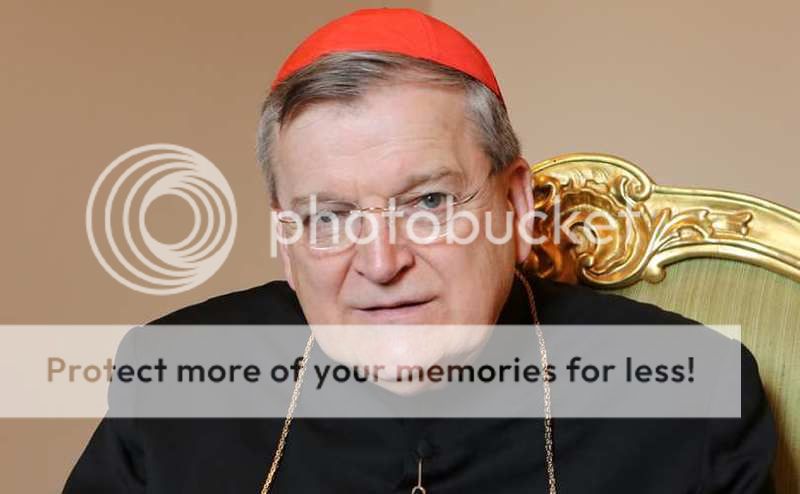His Eminence Raymond, Cardinal Burke
November 30, 2017 (LifeSiteNews) — Confusion and error in the Catholic Church regarding its fundamental teaching on marriage and family are so serious that the End Times may have come upon us, Cardinal Raymond Burke said in a new interview.
When the foundation of the moral law is questioned within the Church, the cardinal said, “then the whole order of human life and the order of the Church itself are endangered.”
“So there is a feeling that in today’s world that is based on secularism with a completely anthropocentric approach,” Cardinal Burke continued, “by which we think we can create our own meaning of life and meaning of the family and so on, the Church itself seems to be confused.”
“In that sense, one may have the feeling that the Church gives the appearance of being unwilling to obey the mandates of Our Lord,” he stated. “Then perhaps we have arrived at the End Times.”
Cardinal Burke confirmed in an interview with Catholic Herald contributing editor Paolo Gambi published today that “very serious questions” remain regarding the dubia submitted to Pope Francis last year on his exhortation Amoris Laetitia.
But he persisted in that the specifics of how to proceed on a formal correction of the pope have yet to be determined.
Cardinal Burke has been long known for his defense of Church orthodoxy, and many regard his resoluteness to that end in the face of seemingly political demotions and derision as an example of courage and fidelity to the faith.
Burke further confirmed in the Catholic Herald interview that although he remains cardinal patron for the Order of Malta, he currently has no function within the Order and thus receives no communication from either the organization itself or from Pope Francis.
He reaffirmed in the interview as well that priests are free to celebrate the Extraordinary Form of the Mass since Pope Benedict XVI’s motu proprio Summorum Pontificum, saying that both the Ordinary Form and the Extraordinary Form of the liturgy are considered normal in the Church.
Gambi asked the cardinal to expound on recent comments he made about the present time being “realistically apocalyptic” due to “confusion, division and error” within the Church coming from “shepherds” even at the highest levels.
Cardinal Burke explained that allowing access to sacraments for individuals living in sinful unions is “a violation of the truth” for both the indissolubility of marriage and the sanctity of the Eucharist.
“In the present moment, there is confusion and error about the most fundamental teachings of the Church,” said Cardinal Burke, “for example with regard to marriage and the family. For instance, the idea that people who are living in an irregular union could receive the sacraments is a violation of the truth with regard both to the indissolubility of marriage and to the sanctity of the Eucharist.”
Citing St. Paul, he said “we eat our condemnation” if we receive the Eucharist in an unworthy way.
“Now the confusion in the Church is going even further than that,” Burke added, “because there is today confusion as to whether there are acts which are intrinsically evil and this, of course, is the foundation of the moral law,” imperiling the order of the Church and human life.
Asked his thoughts on Italian Episcopal Conference Secretary-general Bishop Nunzio Galantino’s recent claim that the Protestant Reformation was an “event of the Holy Spirit,” Cardinal Burke responded, “Well, I don’t see how you can say that the division of the Church was an act of the Holy Spirit. It simply does not make sense.”
He also dismissed talk of a common Eucharistic celebration with Lutherans as “not possible” because of the differences on the doctrine of transubstantiation.
“For Catholics to engage in some kind of ecumenical Eucharist would be abandoning the Catholic Faith,” stated Cardinal Burke. “This is a profoundly false ecumenism which would do grave harm to the Faith and to souls.”
His response to Gambi asking what his first act would be if elected pope was that “the first thing any pope should do is simply to make the profession of faith together with the whole Church, as Vicar of Christ on Earth.”
“Most popes did that,” Cardinal Burke added, offering Pope St Pius X’s encyclical E Supremi as example.
“Also Pope St John Paul II’s Redemptor Hominis is a sort of profession of faith,” the cardinal noted, “calling to mind again that the Church is the Body of Christ, the Church belongs to Christ and that we are all obedient in his service.”

No comments:
Post a Comment
Comments are subject to deletion if they are not germane. I have no problem with a bit of colourful language, but blasphemy or depraved profanity will not be allowed. Attacks on the Catholic Faith will not be tolerated. Comments will be deleted that are republican (Yanks! Note the lower case 'r'!), attacks on the legitimacy of Pope Leo XIV as the Vicar of Christ, the legitimacy of the House of Windsor or of the claims of the Elder Line of the House of France, or attacks on the legitimacy of any of the currently ruling Houses of Europe.